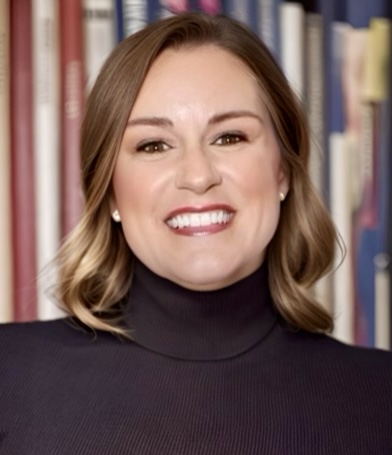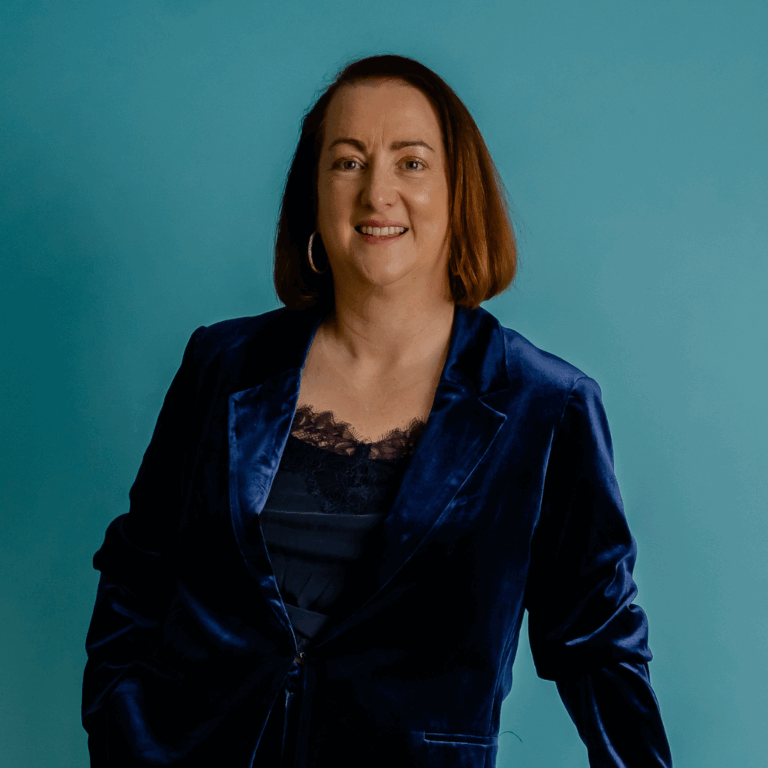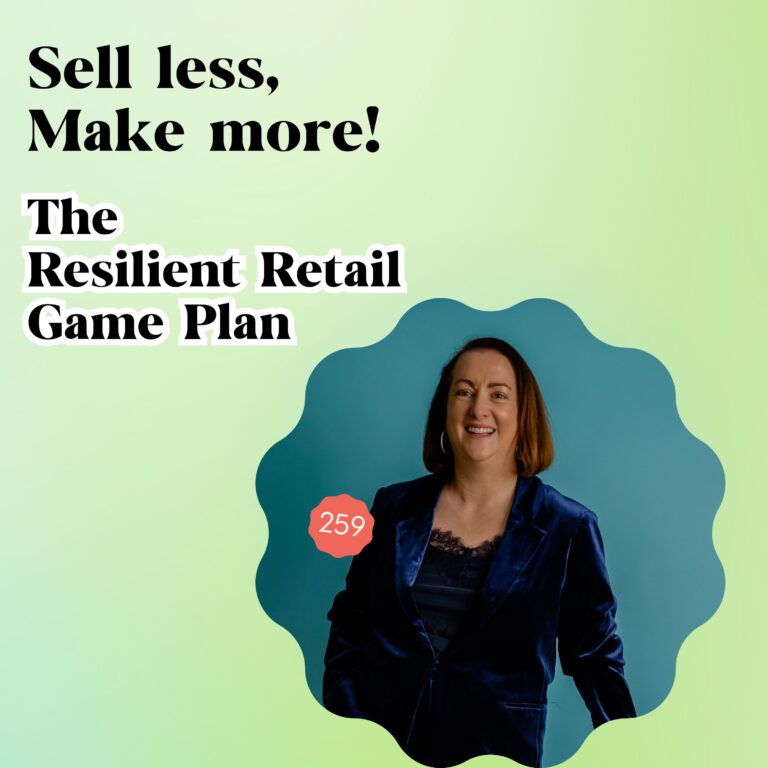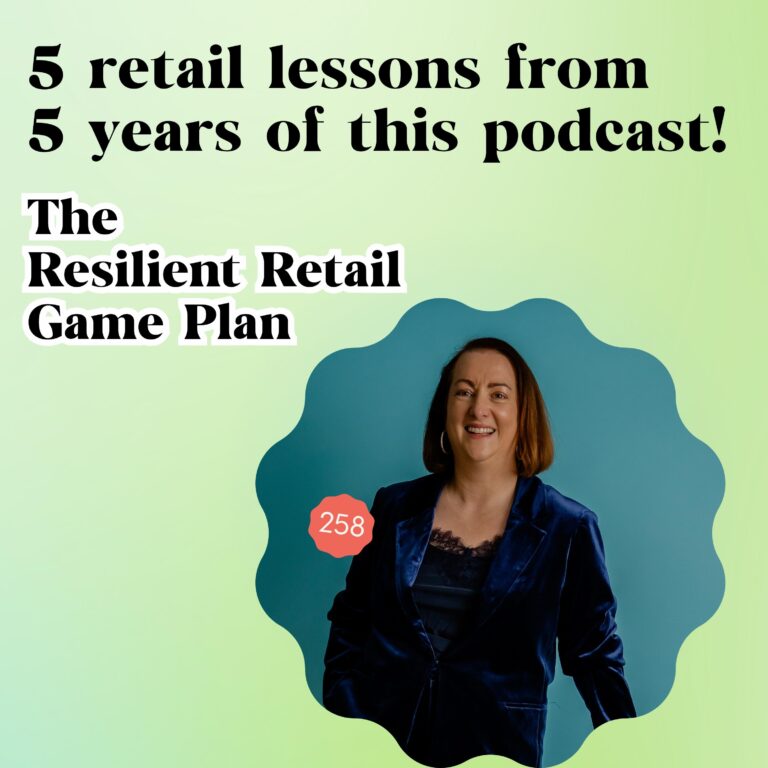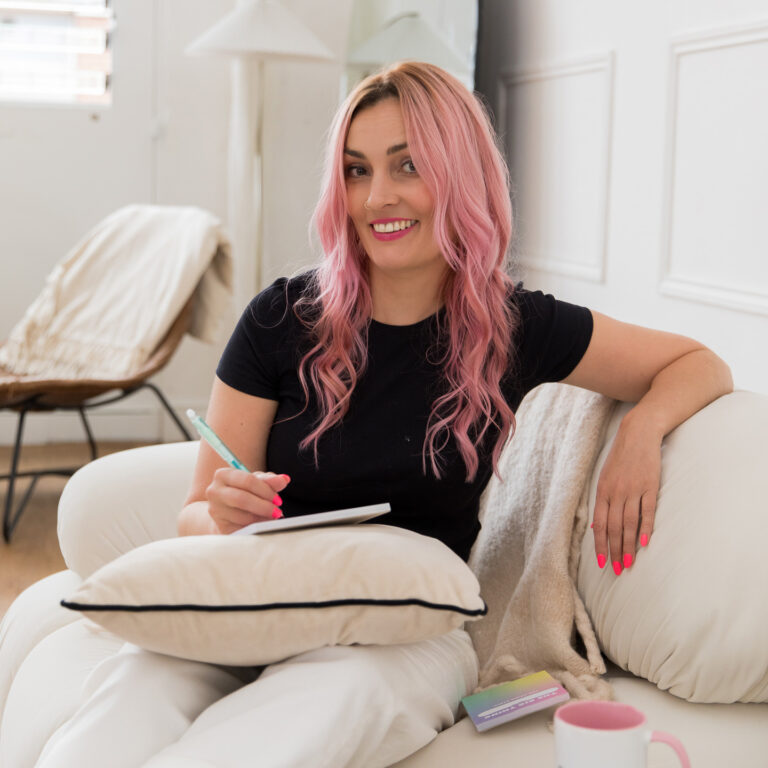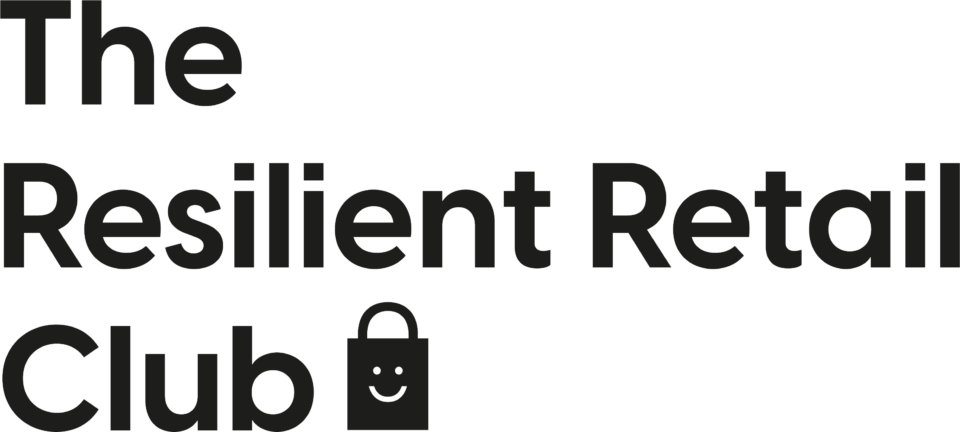SEO Strategies for E-commerce and Local Retailers with Amy Cook from Wild&Mango
Catherine Erdly: Search engine optimization or SEO. What’s new for 2024 and what do you need to be thinking about for your business? In particular, if you’re a bricks and mortar store, how do you use local SEO to grow your sales? That’s what we’re going to be talking about today.
Meet Amy from Mango&Wild
Catherine Erdly: I’m joined by Amy from Mango&Wild, and she is an SEO and paid ad specialist.
And she’s going to be telling us all about what’s new for 2024 and what you need to be focusing on in your business.
Welcome to the Resilient Retail Game Plan, a podcast for anyone wanting to start, grow or scale a profitable creative product business with me, Catherine Erdly. The Resilient Retail Game Plan is a podcast dedicated to one thing, breaking down the concepts and tools that I’ve gathered from 20 years in the retail industry and showing you how you can use them in your business.
This is the real nuts and bolts of running a successful product business, broken down in an easy, accessible way. This is not a podcast about learning how to make your business look good. It’s the tools and techniques that will make you and your business feel good. Confidently plan, launch, and manage your products, and feel in control of your sales numbers and cash flow to help you build a resilient retail business.
Hello, Amy. Thank you so much for joining me on the podcast today. Do you want to start by introducing yourself and your business?
Amy Cook: Yeah, definitely. Thanks for having me. But yeah, I’m Amy founder of Mango&Wild marketing. The business has I guess been going for around five years now. And prior to that, it was very much falling into the world of marketing, really doing agency life and corporate work. And then it was moving into doing the, predominantly SEO and paid ads where I found a passion in those and realized that they’re the two areas of marketing that always seem very jargony and scary.
I was petrified of them, when I worked in corporate so yeah, I took it on myself to learn those things. And that’s how I eventually ventured into. Mango&Wild. Cause I wanted to help business owners see the value in SEO and paid ads and know that it is, great marketing tools that they can use.
So we help businesses in terms of doing it for them or teaching and educating them how to do it for their own business.
Catherine Erdly: Such a great point about them being jargony and intimidating. I think there’s definitely two areas that for small business owners, they feel like, the dark art of SEO and this kind of thing.
The Importance of SEO in 2024
Catherine Erdly: So let’s start by touching on SEO then. So in 2024 particular, I know that there’s been lots of changes the way that Google’s been displaying such results, their AI summaries and things like that. So SEO, search engine optimization in 2024, what exactly does it mean and why is it important for businesses?
Amy Cook: Yeah, definitely. I think it’s really important because we spend a lot of time and effort on building a website, for example, and then we leave it there. And I always think the website is the hub to where we want to send people to, you know, wherever we’re doing social media posts or outreach, whatever it may be. We’re always sending people to our website. So why are we not using that as our best marketing tool is how I always look at it. SEO is basically what that does. It allows your website to become visible on Google, which again is probably the platform that most people search on.
And I think it’s a platform that has a much higher intent of customer because, these people are people who are physically looking to purchase something or physically looking for help. For example, if I take social media, I would look at social media for inspiration or something like when we built our house, I would go for inspiration for interior design and furniture and stuff like that.
But if I was going to them physically buy a sofa, I would go to Google and online to look for those places to actually purchase it, whether it was purchasing it online or looking for local sofa shops to actually go and purchase it. So that’s where I think SEO has a massive importance to business because you’re pitting yourself in front of your customers and when they’re at their most highest buying stage, so you’re more likely to get, the clients you want. And I guess the right clients, because, they’re coming to you and purchasing from you because they’ve got that intent there to purchase.
Catherine Erdly: sure. And do you think it’s changed the way that we need to be focusing on SEO? Do you think it’s different in 2024? Are there sort of common principles that hold true even as the search engine themselves change.
Amy Cook: It definitely still very much remains the same. Obviously AI has become more involved in it. And there’s always been a big question on should you create AI content or how well will Google rank AI content over normal content? And that Google doesn’t really care in the sense that as long as the content is relevant to the search term that someone’s searching for and it’s helping them, that’s their goal.
All Google’s goal is to do is answer that person’s search query. So. As long as your website does that, then, in the eyes of Google, you’re doing what they need you to do in terms of supporting people with giving them the right websites. I guess it’s just making sure there’s always been just a very strict thing on I guess making sure it is humanized because obviously if we all just copy and paste from AI Google and people won’t understand which is more important or Which one’s real which one’s not so that’s where it becomes important to making sure that If you are using more tools or going down that route by using AI to help you, you know with content and things. Be sure you’re using it in the right way because SEO has always been, they always say content is king when it comes to SEO.
And I guess that’s why when we build websites, we predominantly then continue creating blog posts and things after. So then we’re always creating new content to give to Google and give to our audience. And obviously if you’re creating lots of blog posts a month, we totally get that’s time consuming and that’s where AI has its advantage, but it’s making sure you still are humanizing it and adding your own personal touch to it to allow it to be unique and more valuable for Google and your audience. Because, it’s all good. And wow, I guess with SEO, it’s thinking the kind of content and the keywords you’re targeting are about getting the people to your website, but then it’s your website’s job to then obviously convert them.
It’s all good and creating all this information and targeting all these keywords, but if you’re then not actually relevant or speaking to your audience in the right tone or the right way, then you’re not going to be benefiting from SEO because those people are just going to be dropping off straight away. That’s where it has to have that balance of, creating that information to get yourself visible, but then also making sure it’s valuable to keep your visibility there.
Catherine Erdly: Absolutely. Cause presumably I’ve heard that Google, very much does prioritize websites where the people who go there seem to be happy. So if you’ve got people staying for a long time on the website and they’re actually purchasing from you, or they just seem to be happy with the result of the search.
Whereas if people arrive and then immediately leave Google starts thinking, okay Maybe this isn’t that valuable.
Amy Cook: yeah. And I guess that’s how they pill it through their checklist, in the sense of, if someone clicks on a site and then drops off straight away, you can realize you haven’t answered that person’s search query. So you haven’t helped them. Yeah. You’re not going to remain in that position, if lots of people keep clicking and clicking off because you’re not helping and that their goal is.
So that’s why, like you say, it is about, having that customer experience as well. That’s why kind of things like how quick your site loads and things like that is, really important or, How the flow of your, websites designed is important because obviously it’s, again, making sure you’ve got the right call to actions in the right places and things to allow people to remain engaged on the website.
So Google can see that people are spending on time there so they can see that then you’re answering those queries that they’ve put in because of clicked on you and they stayed on you. They might’ve clicked on other pages. So again it’s showing Google that you have helped them because they’re staying on your website over someone else’s.
So
Common SEO Mistakes to Avoid
Catherine Erdly: So let’s say you’re an e com business. There’s lots of people listening to podcast are, and you realize that your website isn’t ranking, so you might’ve identified what your keywords are, but you’re page 20. What are some of the top mistakes that you could be making that you should just double check?
Amy Cook: the biggest kind of things that we commonly see when we kind of audit websites are SEO titles and meta descriptions not being filled in. So this is the thing that you actually click when you go onto Google and search. So that’s the thing that makes you click onto that website over someone else’s.
Now, most e commerce brands use, Shopify or WordPress and all of these platforms. Automatically create your seo titles and meta descriptions from your product titles and product descriptions, for example but Sometimes with that it means that those product titles and things can be too long.
So Normally an seo title should be no more than 60 characters And a meta description should be no more than 160 So this is one of the common things that we see Not filled in or too long or not input correctly because it’s just been auto created and It’s one of the biggest ranking factors to ranking on google because it’s the kind of thing that tells google What that page is about before they’ve even clicked on it.
So again you filling this in yourself and Inputting the seo titles and meta descriptions to make them more keyword relevant and more click worthy You’re increasing your chances to then actually rank on Google. So that’s one of the biggest things we always see.
And the other thing we often see and another kind of big ranking factor to Google is headings.
So when you obviously create a website. You have heading tags like a heading 1, a heading 2, a heading 3, and so forth. Those tags are there for Google to read the page and how, the order priority of what that page looks like. Often you always make sure you’ve got a heading one tag and it’s always at the top of the page because again The second google loads that page.
That’s the first thing they read. So that’s what tells google that page is about x for example often Most websites have more than one heading tag on a landing page So again, google doesn’t really then know which one it’s reading because there’s too many of them and Often, sometimes they don’t even have a heading one tag at all. So again, that’s another really big thing that can cause issues with, reiterating to Google what that page is about.
And then the last thing, which is like we’ve mentioned is content, content is king when it comes to SEO. And I think e commerce brands often miss The opportunity on collection pages because people don’t necessarily know what they want to purchase they know what kind of product they want to purchase But don’t quite know yet what it could be for example They want to purchase a candle, but they’re not quite sure exactly what scent so they want to explore. So this is where your collection pages can draw them into more brand awareness of your products and then hopefully entice them to then purchase through your collection pages.
But often again, we don’t ever really pick content on our collection pages. If we go to, and again, it’s whoever’s listening to, and I’ll use this as an example, because we just brought a sofa from there, but So if you go on to for example, Sophology and you go on to their collection pages At the very top of their collection pages.
They obviously have a bit of description they then have some like Internal links at the top that you can quickly link to two seater sofas or three seater sofas and stuff like that And then if you scroll to the very, very bottom, all the way past their products, they always have a block of text at the bottom.
Again, talking more about fabric sofas or leather sofas or reclined sofas. Now us as users don’t see that because we’re just on the page looking at the products, but that content is at the bottom of that collection page. Because The more content we have, the more places we can put our keywords, the more we can re illiterate what the page is about.
And that’s one place that’s often missed with collection pages is there’s not enough content on them to actually say to Google, this page is about candles or this page is about gift, gift boxes or whatever that may be.
So they’re the three kind of main common things I would say we often target and see missed on e commerce brands.
Catherine Erdly: Okay. Great. Really good advice there. So yeah, if you can put the text at the bottom and then it’s not getting in the way of the customer’s purchasing flow, but it’s allowing Google to really understand more about what’s going on.
Amy Cook: Exactly. Exactly.
Understanding Local SEO
Catherine Erdly: Okay, let’s move on and talk about local SEO. And as I know, this is something that you’re really passionate about.
So tell us a little bit about local SEO, what it is and how it differs from say, e commerce SEO.
Amy Cook: Yeah, definitely. So local SEO is more optimizing, like it says for locally. It’s probably better for more service based businesses rather than e commerce, I would say, because often, if you’re an e commerce brand, you can ship UK wide or whatever that may be.
Catherine Erdly: About, how about for say, bricks and mortar?
Amy Cook: Yes, that would be the only reason you would want to really optimize for local SEO is, if you actually have a physical store that someone can come to.
It’s just basically I guess the same in the sense of you’re targeting keywords, but you’re targeting more localized keywords. Let’s just take the sofa example instead like fabric sofas you’re searching for fabric sofas in london, for example, so you’re looking for a physical place to go and look at fabric sofas.
It’s about creating content on your site that is localized. So then it allows Google to pick up those localized keywords. But the really important thing to have if you are doing local SEO is I don’t actually know what it’s called now, but I still call it Google my business. I think it’s, I think.
I don’t know what it’s called. I just always call it Google My Business. A Google My Business profile is, another place to give you an opportunity to locally show up, If we look at a restaurant, for example, we don’t go onto a restaurant’s website.
We look at the local map to see, what restaurants are in that area. And then you look at the reviews and things of those restaurants. So That google my business is there for local seo and it’s a really good place to Give you another opportunity to show up on maps and things.
And again, target keywords in kind of a map area but the key was making sure your Google, my business profile is optimized as again, trying to get as many reviews and things on there as possible, because the more kind of reviews and things you have, the more opportunity you’ll have to show up at the top of those maps versus the bottom of the map.
So again, you’re giving yourself that bit more visibility over competitors who also have a Google, my business profile.
Catherine Erdly: Oh, okay. So Google actually moves you up if you’ve got more reviews.
Amy Cook: Yeah, it definitely does. It’s keeping yourself fresh in the mind of google. So the more you update your website or the more you update your google My business profile the more you’re in google’s eyes as such. I think it’s like they look at the last 10 changes that you’ve made for example on your website, so Again, if you don’t make any changes for a year, you’re not going to be fresh in Google’s eyes.
So it’s, just thinking about how you can go and make small tweaks to keep it fresh within, in Google system, I guess.
Catherine Erdly: okay. So let’s just to dig into a little bit into more about the local SEO piece, cause I think it’s very interesting.
Practical Tips for Local SEO
Catherine Erdly: Especially, let’s say you are, let’s say you are a gift shop and you’re based in a town, let’s say Kingston upon Thames, just pluck one out of the air. And you’re listening to this and you’re thinking, okay, all right.
This is really interesting. Local SEO. Yes. I definitely want to make sure that I’m popping up when people search for gift shops, Kingston upon Thames. So yes, there’s one piece of it, which is you need to get your Google, my business profile set up and you need to be actively encouraging people to leave reviews so that you rank higher.
But is there anything else that you need to be doing specifically on your site itself in order to make sure that you’re getting that local traffic?
Amy Cook: Yeah. So again, it would be, like I say, creating more content around those local keywords. As well as your online collection pages. It could be that you duplicate those for more localized targeting of SEO. The main ranking factor is filling in those SEO titles and meta description.
Ensure that those have always got, your location filled in within those. So then anytime Google can see that someone’s searching gift shop in yours will be visible more because obviously you’ve got gift shop within your SEO title and then in Kingston on tennis, for example, so by having, your keyword and then the location within that is going to guarantee you the chances to, rank better for localized SEO rather than not having it there
Catherine Erdly: Perfect. And what about doing things like blog posts? Would you do blog posts about places to go in Kingston upon Thames? Or is that too broad?
Amy Cook: Is about being strategic with what you’re creating your content around. I used to work for a care home company, they did very much the same. They had a franchise, so they had locations, across the whole of the UK. So it’d be very much about creating localized blog posts about things to do in chichester or places to go when elderly or stuff like that. So it is about being really strategic with that. Talking about different shots and things within the area, or like you say best places to go for brunch or whatever in Kingston or Thames, but again, trying to also make sure that you are still pulling it back to what you’re selling and stuff, because obviously we don’t blog posts to be there that are just for the purpose of someone, getting some nice tips and leaving, the whole purpose of a website is to convert and sell.
So, you know, if You are selling particular gifts, it could be that, I don’t know, you sell gifts that are relevant to a particular landmark or something that trying to weave it in a way that is strategic, that you’re still giving educational and advice around the local area, but you’re still pulling it back to what you’re selling as well.
Catherine Erdly: Fantastic. Thank you. That’s really helpful. Really good practical example of how Bricks and Mortar store can have a look at their SEO for their local area and the e commerce has got some great tips there as things to check if you feel like you’re not ranking.
How to Connect with Mango&Wild
Catherine Erdly: Thank you so much for joining us. Can you tell us a little bit more about how we can find out more about Mango&Wild?
Amy Cook: Yeah, definitely. I am most active on Instagram, so you can definitely go and follow me over there. I think my name is like amy underscore Mango&Wild. And if not, obviously my website, which is Mango&Wild. com. And like I said, there’s many ways that we offer support to businesses from, done with you in terms of kind of handing over your SEO to us to, Doing SEO audits helping you to build that strategy for your own content and things to also doing Courses where we teach you how to do your own seo, but with our guidance along the way
Catherine Erdly: Thank you so much for listening. If you have a moment, please do rate and review the podcast within Apple podcasts. And of course, if you have a moment to rate it within the Spotify app, you can do that also.
And if you like follow subscribe or whatever it is on the platform that you’re on, then you’ll be the first to know about each new episode that’s out on a Thursday morning. See you soon.


